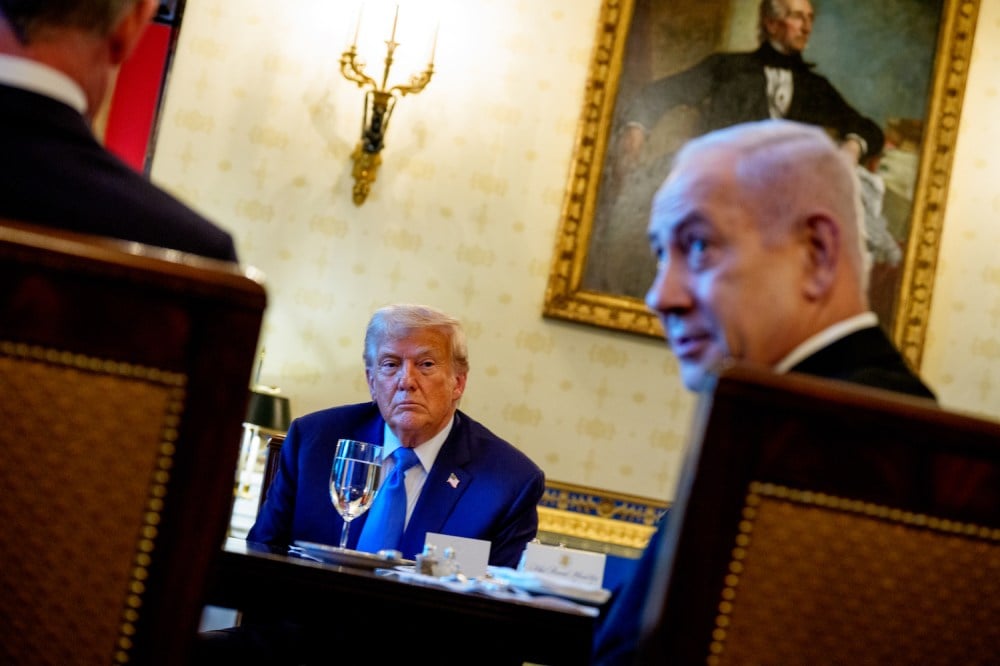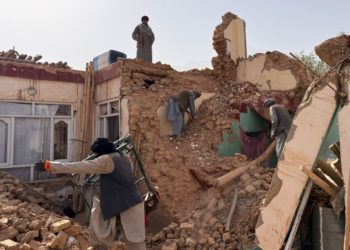I’m pretty sure there’s no part of the world where the contrast between objective reality and U.S. foreign policy is greater than in the Middle East. The invasion of Iraq, the “Freedom Agenda,” and various iterations of the Israeli-Palestinian peace process are all examples of American fantasy intersecting with failure over the past several decades. And yet, the delusions persist.
There is no better contemporary example of this than the low rumblings among at least 26 Democratic members of Congress who favor recognizing a Palestinian state. Last week, at an on-the-record meeting at the Council on Foreign Relations, Rep. Ro Khanna of California, who is leading the effort, said U.S. recognition of Palestine would advance the two-state solution.
“This will offer people hope in the region. It will offer a concrete solution away from Hamas,” he said.
Setting aside the moral case and Khanna’s admirable and serious interest in settling the Israeli-Palestinian conflict for the good of both peoples, his vision is almost exactly what President George W. Bush articulated 23 years ago: two democratic states—Israel and a demilitarized Palestine—existing side by side in peace. Khanna just flipped the sequence, placing recognition of Palestine ahead of peace.
But he struggled to elucidate how recognition would produce the outcome that he wanted, almost naïve to the political realities of Israeli and Palestinian societies. The two-state solution was already a long shot before Oct. 7, 2023. The Hamas attacks on Israel that day and the subsequent war in Gaza have made it virtually impossible to imagine.
Khanna’s numerous references to long-irrelevant Israeli politicians, including Yitzhak Rabin, who was assassinated in 1995; Shimon Peres, who died in 2016; and Ehud Barak, who last led Israel almost a quarter-century ago, revealed a typically American desire for the world to be the way that we wish as opposed to the way it is.
It is not just Khanna and his colleagues. The Trump administration is also guilty of wish-casting—about Hezbollah and Hamas disarmament. Israel’s onslaught in Lebanon, beginning in September 2024 with the infamous beeper attack, liberated Lebanon’s political system from Hezbollah’s grip, allowing for the election of a new president—after a dozen previous attempts—and the selection of a new prime minister. President Joseph Aoun and Prime Minister Nawaf Salam have since begun the process of dismantling the state within the state that Hezbollah built over four decades.
Yet for all of Israel’s military accomplishments and the good intentions of Lebanon’s new leaders, Hezbollah has not been destroyed. It is weaker than it was, but it still has guns, its cadres are motivated, and Iran has not given up on rebuilding it. This is why Israel has been “enforcing” the cease-fire that Washington brokered in Lebanon last November with occasional military strikes—and the reason that Team Trump wants Hezbollah to be disarmed.
Toward that end, U.S. Ambassador to Turkey Tom Barrack—a Middle East envoy second only to Steve Witkoff—proposed a four-phase plan for the Lebanese Armed Forces to accomplish this goal.
But Barrack might be underestimating just how combustible Hezbollah’s disarmament would be. How can an organization based on “resistance”—whose very flag declares it to be “The Party of God” and “The Islamic Resistance in Lebanon” with an assault rifle thrust into the air—disarm? It is asking Hezbollah not to be Hezbollah.
That is a worthy goal, but is it something that can be accomplished—especially by the end of the year, as the Trump administration is demanding? When Lebanon’s military commanders presented their plan to carry out disarmament to the government in early September, Hezbollah-affiliated members of the government walked out.
Many of Lebanon’s Sunni, Christian, and Druze citizens no doubt support Hezbollah’s disarmament. It is unlikely that large numbers of Shiites do, however. Hezbollah’s arms have been a source of power for the Shiite, whose numbers outweigh their influence in Lebanon’s confessional system in which each of Lebanon’s major religious factions are granted specific roles. Thus, the president is always a Christian, the prime minister a Sunni, and speaker of the parliament a member of the Shia community. Hezbollah leader Naim Qassem—the successor to Hassan Nasrallah, who was killed in an Israeli airstrike in September 2024—is both a guerrilla leader and a politician. Agreeing to disarm would erode his support. Hezbollah politicians argue that the plan proposed by the military—the details of which have not been made public—amounts to a “complete submission from the Lebanese to the American government.” They want to know why Hezbollah has to give up its weapons before Israel withdraws from the five outposts that the Israeli military holds in southern Lebanon.
Of course, the Lebanese military could use force, but the risk of violence is clear. Hezbollah may be no match for the Israeli military, but the AK-47s, rocket-propelled grenades, and heavier weapons that the group still possesses are a threat to peace and social cohesion in a country that has experienced all too little of both over the past five decades. The Trump administration and others in Washington who are demanding Hezbollah’s disarmament seem naïve about the consequences of a shoot-out between Hezbollah and Lebanese forces.
Of course, I am willing to be surprised. There have been many “holy moly” moments in the Middle East over the past two years. Perhaps Hezbollah is weaker than people believe, and Lebanon’s military can take away every last gun and bullet from the group. Still, I remain skeptical that Lebanese commanders want to risk it. That is why a longer, more drawn-out process of negotiations and under-the-table dealing, which may leave Hezbollah with some weapons as an auxiliary to the armed forces, seems more realistic and wiser than the Barrack plan.
There is a similar dynamic underway regarding Hamas (an acronym for the Islamic Resistance Movement). The group is not going to give up its arms unless it is compelled to do so, and despite all their efforts and firepower, the Israelis have not been able to force Hamas to submit. Requiring the group to give up its arms is not a bad thing, but is it consistent with reality? No. And that is not just my view—it is also that of the Israeli military chief of staff, who has counseled the Israeli government to accept recent cease-fire proposals.
It would certainly be good if there was a Palestinian state existing side by side and at peace with Israel. It would also be a net positive if Hezbollah and Hamas disarmed, but reality makes these goals exceedingly difficult. I am struck that Khanna—a progressive Democrat—is taking a page from Bush’s two-decade old playbook not just in his vision of two states, but also the intensive U.S. engagement in the Middle East that peace-processing and nation-building require.
In a similar vein, it is quite odd that the Trump administration is willing to become entwined in the complex issue of disarmament, especially in Lebanon. This runs counter to the ideas that the president advanced during his visit to the Gulf in May, when he specifically repudiated this kind of U.S. engagement.
It’s admirable for U.S. officials to want to make the world a better place, but when your policy diverges from the world as it is, then failure is likely to be the result. Just look at the U.S. record of the past three decades.
The post The Delusions Driving U.S. Policy in the Middle East appeared first on Foreign Policy.



